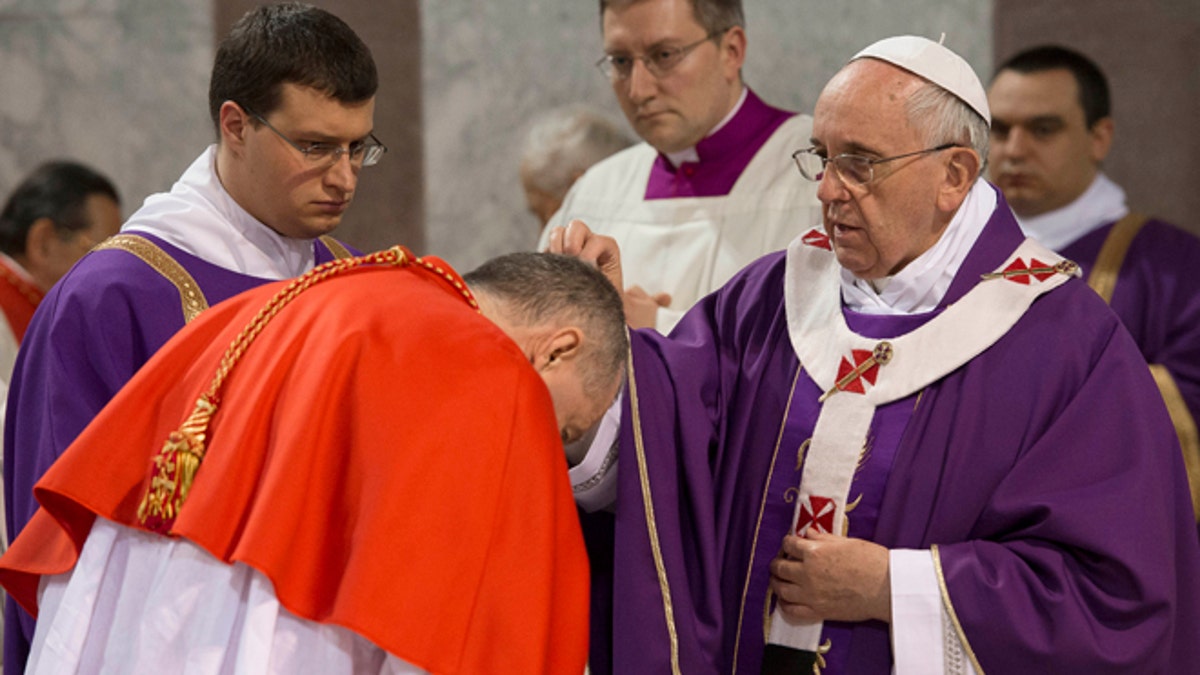
March 5, 2014: Pope Francis sprinkles with ashes a cardinal during the Ash Wednesday mass at the Santa Sabina Basilica in Rome. (AP/L'Osservatore Romano)
One year after Pope Francis took the reins of the Catholic Church, a new survey finds he is one of the most popular pontiffs of the modern era among American Catholics.
According to a new Pew Survey, "Pope Francis remains immensely popular among American Catholics and is widely seen as a force for positive change within the Roman Catholic Church."
The survey says that 85 percent of U.S. Catholics have a favorable view of Francis, including more than half (51%) who view him very favorably. And the percentage who view him very favorably is close to rivaling the percentage who felt the same about Pope John Paul II in the 1980s and 1990s.
The Blessed John Paul, who will become a saint in the Catholic Church in April, is arguably one of, if not the most, beloved popes of the twentieth century.
CLICK HERE TO READ THE SURVEY RESULTS
While also widely popular, Francis' overall favorable ratings "remain a few points shy of the long-serving Polish pope."
But Greg Smith, director of religion research for Pew, says it is difficult to compare the popularity of the two popes, because the first reading on John Paul was eight years into his papacy. And there were no readings after 2000 when news of the clergy sex abuse scandal was all over the news.
"I'm reluctant to say Francis is less popular," says Smith.
But the survey points to what has been described as the Francis Effect says Matthew Bunson, senior correspondent for Our Sunday Visitor, a national Catholic Magazine. Bunson explains that, "He [Francis] "hasn't hit the reset button, but he's done a lot to repair the general public image of the Catholic Church in the wake of the sex abuse crisis."
In contrast, his predecessor Pope Benedict XVI's highest favorable rating of 83 percent came in 2008, three years into his papacy. It was also the year of his pilgrimage to the United States, a time of pomp, pageantry and positive feelings about German-born pontiff. But it didn't last long. By February of 2013, the month he announced his resignation, Benedict's overall favorable rating was at 74 percent.
Bunson says it has a lot to with style. "There's been, I think, an ability on the part of Francis to re-ignite a dialogue between the church and the modern world. Benedict saw that as important, too, but wasn't positioned by temperament or disposition, to do so. Francis brings a natural gift to speak to all people of different backgrounds" that is "deeply personal and authentic."
The Pew survey does not confirm a Francis Effect, but at the same time does not deny there could be one. While there is no discernable change in the way American Catholics approach their faith, no "measurable rise" in the number who identify as Catholic or attend weekly Mass, there does seem to be a more intense religiosity among Catholics who practice their faith. Four in ten Catholics say they've been praying more, and 21 percent say they’ve been reading the Bible and other religious texts more frequently.
From the beginning, the Francis papacy set a different tone. His humbler, folk-friendly style endeared him to Catholics as well as non-Catholics. He paid his own hotel bill after the Conclave that elected him. On the plane from Rio de Janeiro after last summer's World Youth Day, he gave his famous, 'who am I to judge" quote concerning gays and lesbians.
Francis has also made personnel changes in the Vatican Bank, to begin straightening out Church finances. In addition, he has elevated 19 new cardinals, men who reflect a more international and less Western focus for the Church.
Together, these moves have buoyed Catholics who want changes in the Church, and most now see Francis as the man to do it. The survey showed that among Catholics, 71 percent say Pope Francis represents a major change for the better. Even 56 percent of non-Catholics believe the same.
More than half, 56%, of Catholics in the survey expect that by 2050, the Church will allow birth control, and 51% expect the Church to allow priests to marry.
"Francis is doing two things," says Bunson. "He's restating Catholic teaching, and then trying to point out here's what we need to do with it."
In other words it is not the content of the message that Francis is trying to change, it is how it is received.
